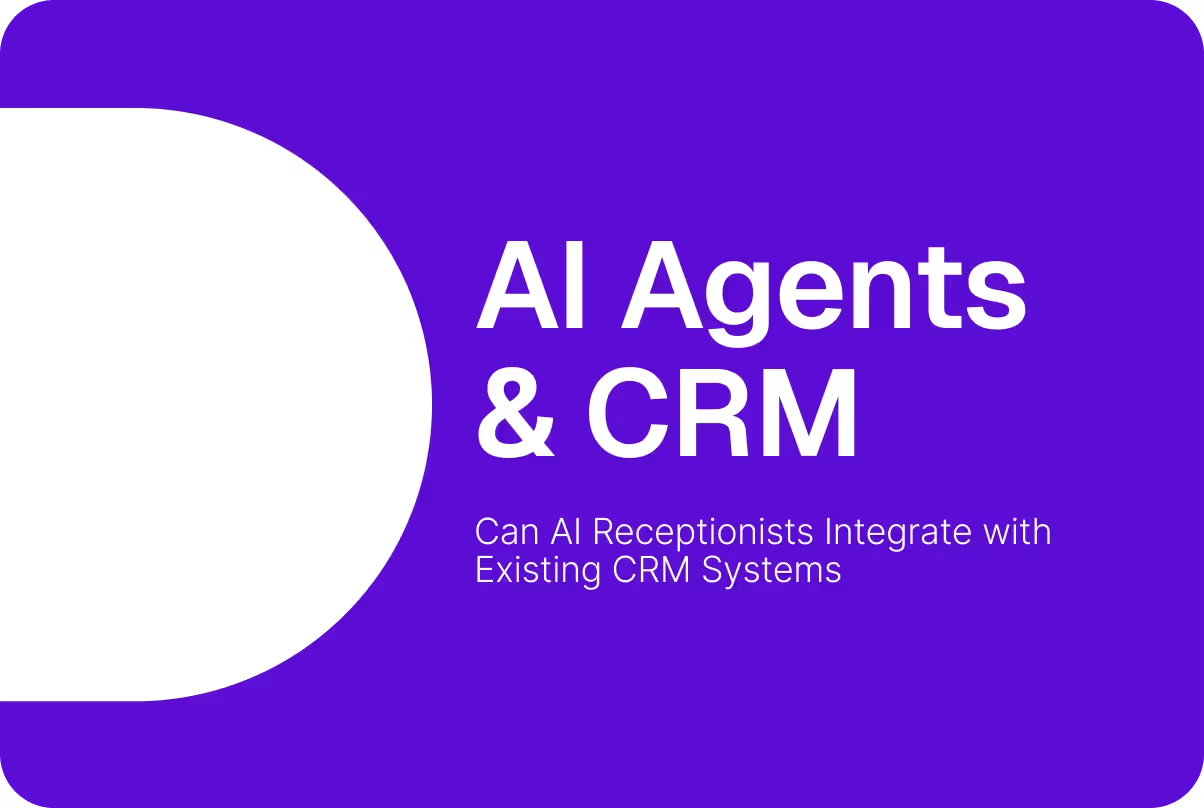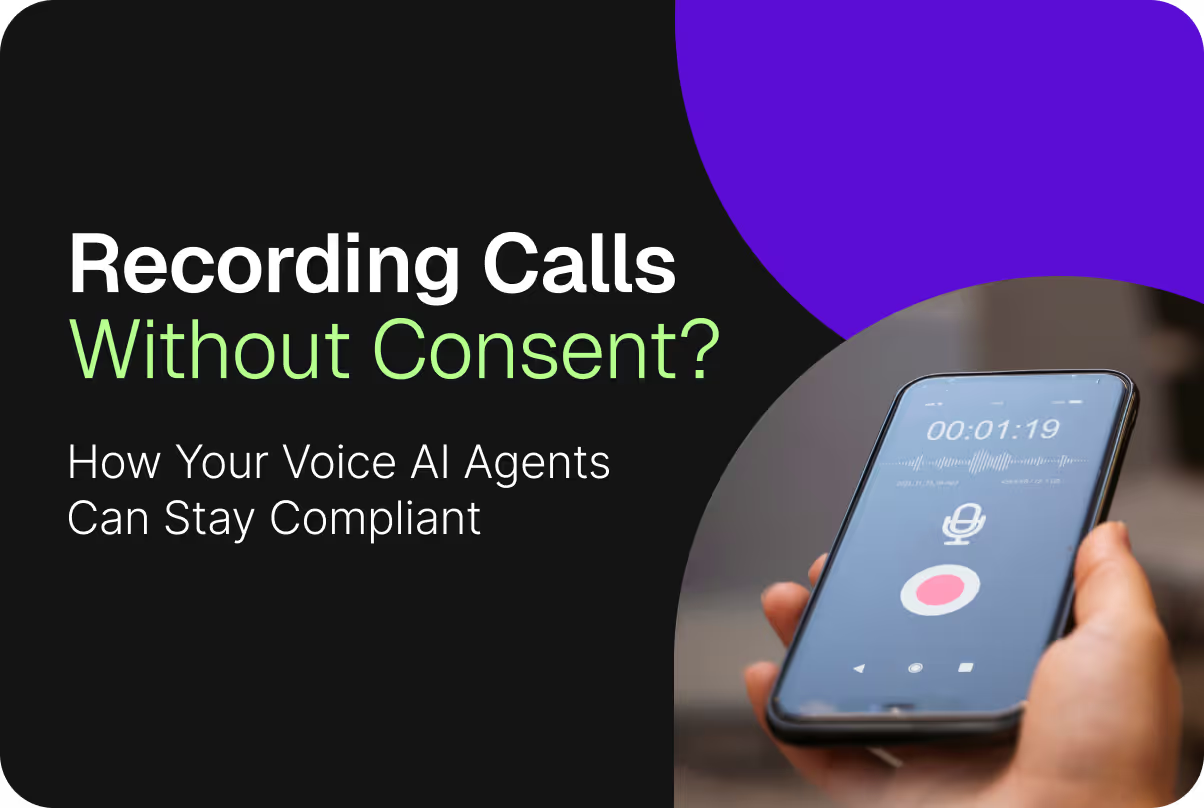Yes, AI receptionists like Synthflow can integrate with CRM systems like HubSpot, Zoho, and GoHighLevel. Using its API, businesses can connect AI voice agents to CRMs, streamlining tasks such as lead qualification, customer support, and appointment scheduling. This enhances workflow efficiency and ensures up-to-date customer data for improved service.
Benefits of Integrating AI Receptionists with CRM Systems
The integration of AI receptionists with CRM systems brings several key advantages, allowing businesses to enhance customer interactions, automate workflows, and increase efficiency
Personalized Interactions
AI receptionists can access CRM data in real time, which allows them to personalize customer interactions. For example, if a customer calls, the AI can retrieve their purchase history and past inquiries, making the conversation more relevant and efficient. This improves the customer experience by offering timely and tailored responses.
Synthflow, for example, integrates with CRM systems like HubSpot, enabling real-time access to customer data during calls.
Automated Lead Qualification
AI receptionists automate lead qualification by asking preset questions and logging responses directly into the CRM. This saves time and ensures only high-value leads are passed to sales teams. The CRM can then automatically schedule follow-ups or send additional information, minimizing the chance of losing prospects.
Scalability and Efficiency
AI receptionists help businesses scale without adding additional staff. The AI can handle multiple calls at once, and integration with CRM systems ensures customer data is always up to date. This reduces the need for human agents to perform repetitive tasks, increasing efficiency.
By integrating AI receptionists with CRM systems like GoHighLevel, businesses can streamline their workflows and reduce manual data entry.
Automated Data Entry
AI receptionists automatically update CRM records with information gathered during interactions. This includes logging call details, scheduling follow-ups, and updating customer profiles. This ensures that the data in the CRM is always accurate and reduces the need for manual updates, saving time and effort.
Key Features Needed for Integration
Certain features are essential for successful integration between AI receptionists and CRM systems. These features ensure smooth communication and effective data sharing between systems.
API Connectivity
For successful integration, APIs are essential. They enable the AI receptionist and CRM system to communicate seamlessly. APIs allow the AI to pull customer data from the CRM and update it in real time. Most CRM systems, including Salesforce and Zoho, offer API support, making integration easier.
Real-Time Data Sync
Real-time synchronization is crucial for keeping customer records updated. Any new information collected during customer interactions, such as a change in contact details, should be reflected immediately in the CRM. This ensures businesses are always working with the most current data, reducing discrepancies.
Custom Workflows
Custom workflows allow businesses to automate tasks based on customer interactions. For example, after qualifying a lead, the AI receptionist can automatically assign that lead to a sales rep or schedule follow-up actions. This helps businesses automate their processes and increase efficiency.
Multi-Channel Support
With multi-channel support, AI receptionists can handle voice calls, chat messages, and emails, all while syncing data with the CRM. This ensures that customer interactions are tracked consistently, regardless of the channel they use.
Challenges in AI Receptionist-CRM Integration
While the benefits of AI receptionist-CRM integration are clear, there are a few challenges businesses need to address to ensure successful implementation.
Technical Complexity
Integrating AI receptionists with CRM systems can be complex, especially for businesses with custom CRM setups. It requires technical knowledge to set up APIs, create custom workflows, and ensure smooth data exchange between systems. Businesses may need outside help to manage the integration.
Data Privacy and Security
Businesses must ensure the integration complies with data privacy laws like GDPR. This includes securing data during transmission and ensuring only authorized users can access sensitive customer information. Protecting customer data should be a priority in any AI-CRM integration.
Cost of Integration
While the benefits are clear, integrating AI receptionists with CRM systems can involve upfront costs. These costs can include the price of the AI solution, API integration, and any developer resources required. Businesses must weigh the initial investment against the long-term gains in efficiency and customer satisfaction.
How Integration Benefits Businesses
Integrating AI receptionists with CRM systems directly contributes to better customer service, higher sales conversions, and cost savings.
Higher Sales Conversions
AI receptionists help qualify leads more effectively. With CRM integration, only high-quality leads are passed to sales teams, increasing the chances of conversion. The AI also ensures that all lead interactions are logged and followed up automatically, reducing manual errors.
Better Customer Retention
By using CRM data, AI receptionists can offer more relevant and timely support. This improves customer satisfaction and builds loyalty. With accurate data at hand, AI systems can respond to customer needs faster, improving retention rates.
Cost Savings
AI receptionists automate routine tasks, making them a key component of customer support automation. This reduces the need for human agents to handle basic queries, resulting in significant cost savings.
Businesses can scale their customer support operations efficiently without increasing overhead. Additionally, integration with CRM systems ensures that all data is tracked and updated automatically, eliminating the need for manual input.
Conclusion
AI receptionists integrate seamlessly with CRM systems, offering numerous benefits, including personalized customer interactions, automated lead qualification, and improved operational efficiency. Real-time data synchronization, API connectivity, and custom workflows are essential for ensuring smooth integration.
While there are challenges such as technical complexity and data privacy concerns, the benefits of increased conversions, better retention, and cost savings make AI receptionist-CRM integration a smart investment for businesses looking to optimize their customer service operations.
FAQs
Can Synthflow integrate with custom CRM systems?
Yes, Synthflow integrates with custom CRM systems through flexible API connections, allowing businesses to connect their AI receptionist with proprietary CRM platforms.
Does Synthflow offer automated follow-up reminders?
Yes, Synthflow can automatically schedule follow-up reminders and tasks in your CRM based on customer interactions, ensuring no leads or inquiries are missed.
How does Synthflow ensure data privacy during CRM integration?
Synthflow uses encryption to secure customer data during transfer between the AI and CRM, ensuring compliance with data protection regulations like GDPR.
Can Synthflow handle support tickets and CRM case management?
Yes, Synthflow can handle support tickets, log them in CRM systems, and track case status automatically, helping businesses streamline customer service workflows.




.avif)

